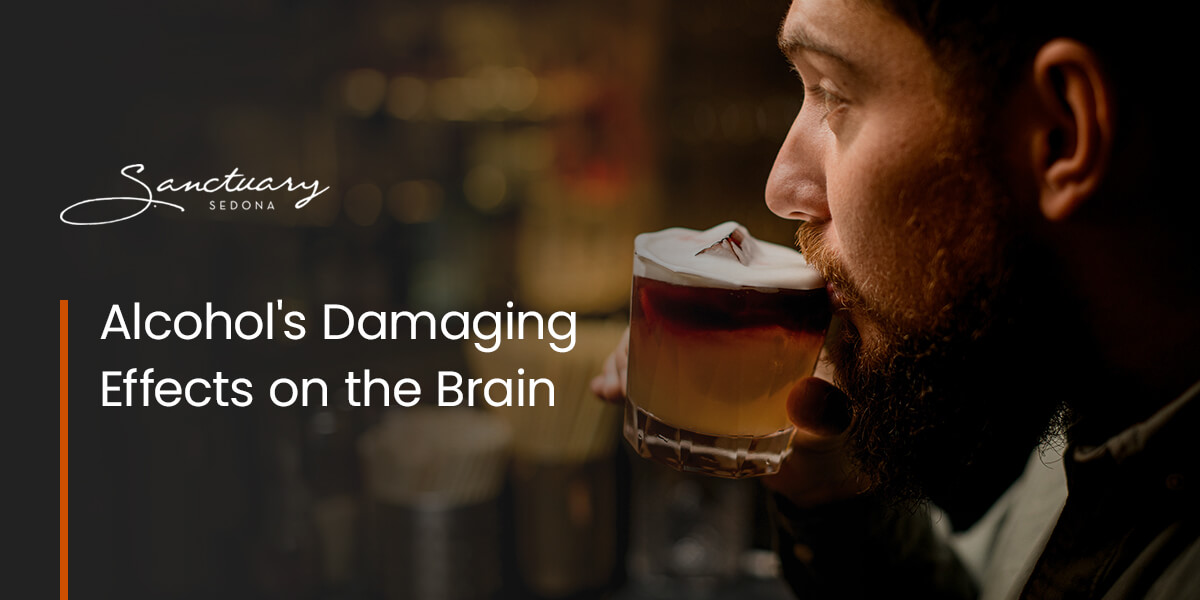Most people assume that drinking will have a minimal effect on their overall health and wellness, and the worst thing that can happen is a hangover in the morning. However, doctors are now suggesting that alcohol might affect brain function even after you are no longer intoxicated. If you are experiencing alcoholism and looking for answers to overcome the addiction, it’s important to learn more about the ways you can boost brain function to support the recovery process.
Learn About Our Alcohol Addiction Program
Is There a Connection Between Alcohol and Brain Function?
Understanding how the brain works under the influence of alcohol is crucial to recognizing its risks and pursuing recovery. Individuals with alcohol use disorder often show signs of decreased brain function, such as memory issues or thinking problems.
Alcohol can interrupt the brain’s communication pathways and hinder many of its functions. It slows central nervous system functions and prevents the brain from effectively controlling the following abilities:
- Speech
- Vision
- Memory
- Retention
- Judgment
- Balance
- Inhibition
- Sleep
- Muscle control
- Response time
- Planning ahead
When someone consumes alcohol, it affects their brain chemistry by changing neurotransmitter levels. These neurotransmitters are tiny messengers that impact emotion, behavior and thought processes. Neurotransmitter levels can either stimulate or inhibit brain electrical activity and studies have shown that alcohol increases specific neurotransmitters that inhibit the functions of the brain.
Short-Term Effects
Since alcohol consumption affects several areas of the brain, individuals under the influence can experience the following short-term effects:
- Injuries
- Forgetting important occurrences or details
- Slurred speech
- Harmful decision-making
Alcohol also reduces inhibition and increases the pain threshold, which may contribute to irrational or dangerous decision-making. Drinking alcohol slows a person’s movements and thought processes. It hinders their ability to perform ordinary tasks such as walking and driving, increasing the risk of injuries and automobile accidents.
Alcohol overdose can occur when an individual continues to drink after experiencing severe impairment. It sends too much alcohol into the bloodstream, impairing the brain’s ability to control life-sustaining functions such as heart rate, breathing and temperature control. An alcohol overdose causes the following short-term symptoms:
- Difficulty breathing
- Vomiting
- Seizure
- Slow heart rate
- Low body temperature
- Mental confusion
- Unconsciousness
- Dulled responses
- Clammy skin
Long-Term Effects
It’s also vital to understand alcohol’s long-term effects on the brain. Heavy alcohol use, long-term consumption or alcohol overdose can lead to death or permanent brain damage. Heavy drinking can also alter or shrink the brain’s neurons over time and long-term or excessive alcohol use can lead to the following challenges:
- Memory conditions such as dementia
- Learning challenges such as poor school performance
- Depression
- Anxiety
- Alcohol use disorder
Continuous alcohol use can progressively change the brain’s function and structure, leading to alcohol use disorder. Alcohol impacts neurotransmitters like serotonin and dopamine, increasing these neurotransmitters and stimulating the brain’s pleasure and reward centers. Eventually, the brain needs more alcohol to achieve the same results, leading to cravings and addiction.
In some cases, alcohol use disorder causes a thiamine deficiency. This thiamine deficiency affects the cerebellum, which controls movement and learning abilities and can lead to Wernicke-Korsakoff syndrome and Korsakoff’s psychosis. Korsakoff’s psychosis is the second stage of Wernick-Korsakoff syndrome that causes chronic memory and learning challenges. Individuals with this condition often experience frustration, forgetfulness, vision problems, poor coordination, disorientation, tremors and trouble walking. It can also lead to a coma in severe cases.
How The Sanctuary Can Help
The Sanctuary at Sedona is a holistic recovery center dedicated to helping individuals heal from addiction. Our natural non-12-step treatment methods can help you recover from alcohol use disorder and improve or recover brain function. If you are experiencing alcohol addiction and decreased brain function, The Sanctuary can help.
Overcoming Alcoholism by Boosting Brain Function
While alcohol-related brain damage can alter your emotions, thinking abilities and behaviors, long-term abstinence and recovery can reverse or improve these effects.
Since we understand the connection between brain function and alcoholism, we take a proactive approach to boost brain function during recovery. Here at The Sanctuary at Sedona, we offer a science-based holistic program to help people overcome addictions. We have found that supporting healthy brain function is an important part of the treatment process.
Dietary Support
One important element in our non-12-step recovery program is supporting the natural functions within the body with a healthy diet. Food consumption has a direct impact on overall health and wellness and certain foods can stimulate brain function. When purchasing food items, we always look for the highest quality organic and pesticide-free ingredients because researchers have suggested that certain pesticides might have a negative impact on brain function.
Healthy fats are among the organic foods that can boost brain function and promote brain healing. Omega-3 essential fatty acids and plant-based phytosterols can boost brain function.
Our dietary plan also focuses on anti-inflammatory ingredients such as fresh fruits and vegetables. Decreasing chronic inflammation can improve brain function and contribute to alcohol addiction recovery.
What Happens in Recovery?
Recovery at The Sanctuary combines effective treatment methods for a holistic approach. When you pursue recovery at The Sanctuary, you can work toward healing with:
- Clinical therapeutic evidenced therapies.
- Complementary treatments.
- Life skill classes.
- Mindfulness meditation.
- Daily practices.
- Recovery tools.
You can work on healing your mind, soul, body and spirit through various talk therapies, exercise-based practices and proper nutrition. We offer treatment methods based on each individual’s unique needs and help them heal the root cause of their addiction.
Start Your Recovery at The Sanctuary at Sedona
Whether you are looking for a holistic addiction recovery program for yourself or someone else, we are here to help. At The Sanctuary at Sedona, we offer a broad range of holistic addiction recovery treatment methods to make it easier to overcome addictive patterns. Contact us online or at 877-710-3385 to learn more about our treatment services and how we can help you recover from alcohol addiction.



